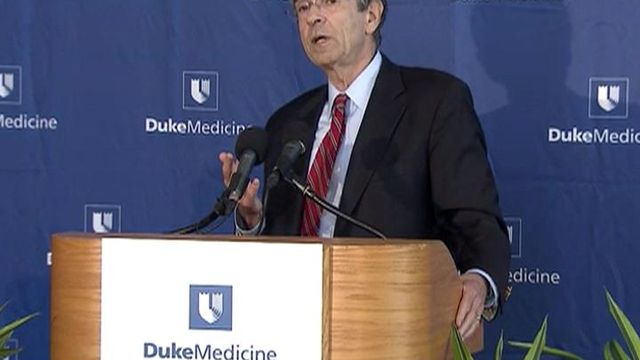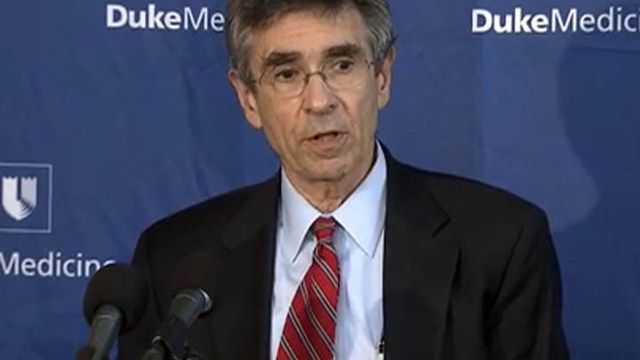Duke professor, former student share Nobel Prize in chemistry
Dr. Robert Lefkowitz, a professor at Duke University, and Dr. Brian Kobilka, one of his former students, have won the 2012 Nobel Prize in chemistry for their study of proteins that let cells in the body respond to signals from the outside.
Posted — UpdatedThe Royal Swedish Academy of Sciences said Wednesday that Lefkowitz and Kobilka have made groundbreaking discoveries on an important family of receptors, known as G-protein coupled receptors. About half of all medications act on these receptors, so learning about them will help scientists to come up with better drugs.
Lefkowitz is the first full-time Duke faculty member to win a Nobel Prize, and he said he shares the award with the university.
"Needless to say, I'm thrilled, I'm excited and I'm delighted to be sharing the award with a former student," he said. "It's a recognition of the (Duke) institution. ... In a very real sense, this is our accomplishment."
Lefkowitz has been a researcher at the Howard Hughes Medical Institute at Duke University Medical Center for 39 years. He also is the James B. Duke Professor of Medicine and Biochemistry at the university.
Dr. Nancy Andrews, dean of Duke's School of Medicine, said Lefkowitz has mentored so many scientists during his time at the university that he should be called "Coach L," much like Duke basketball coach Mike Krzyzewski is usually referred to simply as "Coach K."
"There is no question that his scientific influence will last for decades," Andrews said.
Duke President Richard Brodhead called Lefkowitz "one of the world's natural sharers" of information.
"You made two contributions," Brodhead told Lefkowitz. "One was your discovery, and the second was your discovery of the powers of mentoring, the powers of developing the talents of others."
Kobilka, a professor of medicine and a professor of molecular and cellular physiology at Stanford University, was a post-doctoral fellow in cardiology in Lefkowitz' lab from 1984 to 1989.
"It really shows what kind of caliber institution Duke is," sophomore Russell Wagstaff said. "As a student, it is really encouraging because we know that these are the people who are teaching us. These are the people that are preparing us to go out and move forward after them."
"You go to this university and you are an undergraduate, but anything is possible,” sophomore Ethan Gottlieb said.
Lefkowitz was born in 1943 in New York and earned his medical degree in 1966 at Columbia University.
During a 45-minute news conference Wednesday afternoon, he regaled reporters and colleagues with stories of memorizing the lineups of the New York Yankees as a child and of joining seven classmates at Bronx Science High School as Nobel laureates.
He said he became interested in cell receptors while working at the National Institutes of Health in the late 1960s and was able to extract several concessions related to his research from Duke officials when they recruited him to Durham in 1973.
Lefkowitz described receptors and the proteins that interact with them in terms of fitting a key in a lock. The right key can open certain cells and allow chemicals like adrenaline and histamine to affect the cell's behavior.
Kobilka, a Minnesota native who earned his medical degree in 1981 at Yale University, has built upon his mentor's work by assembling crystalline structures of various receptors. Lefkowitz said that could revolutionize drug discovery by studying which molecules best fit a specific receptor and then synthesizing drugs to match that structure.
Lefkowitz said he almost missed being informed about the award early Wednesday because he wears earplugs while sleeping. His wife elbowed him awake at about 5 a.m., saying, "It's Stockholm calling."
He was in such a fog, he said, that it took him a while to realize that he shared the award with Kobilka, a notoriously shy person who, he said with a laugh, must have sweated through his own news conference at Stanford.
"I really hope (the award) changes me as little as possible," he said. "Frankly, I can't imagine it will."
The Nobel Prizes were established in the 1895 will of Swedish industrialist Alfred Nobel, the inventor of dynamite. Each award is worth 8 million kronor, or about $1.2 million.
In addition to Lefkowitz and Kobilka, three former Duke students have gone on to win Nobel Prizes. Two adjunct professors won while working at Wellcome Research Laboratories in Research Triangle Park, and a former professor won an award for work he did before coming to Duke.
• Credits
Copyright 2024 by WRAL.com and the Associated Press. All rights reserved. This material may not be published, broadcast, rewritten or redistributed.






